
A gray water storage tank, left, and a 3,500-gallon pool are part of the rainwater system seen at in Tucson, Arizona.
(2 of 2)
In Tucson, where the desert climate means that people typically spend at some 45% of their daily water usage irrigating their yards, graywater was something of a no-brainer. Brad Lancaster, an independent water consultant in Tucson, personally started harvesting graywater in 1993, and recalls how he and other graywater wildcatters would share ideas about what worked and what didn't. In Tucson, unlike in colder climates, many people keep their washing machines outside, in sheds or garages, and creating an ad-hoc hookup to water the always-thirsty trees was too easy to pass up.
When Water Conservation Alliance for Southern Arizona surveyed graywater usage from 1998 to 2000, it discovered that 13% of single-family homes in the area were already using graywater systems — illegally. "It was a wake-up call," says Little, who used the data to push through the legislation. The same study found no significant health risks from these wildcat graywater setups, though it recommended that kitchen sinks be excluded because of the potential for contamination.
To get Tucsons to go grey, the city first got rid of the cumbersome permitting process, which many were ignoring anyway. Second, the city's water department, Water CASA and others began hosting workshops. Demonstration sites have been set up, including one at a Habitat for Humanity house, so that locals can see what's doable. Last, city officials have stressed that reconfiguring plumbing is not as expense as you would think. Tucson Water's Grossman estimates that a simple system can be built out for a few hundred bucks, while a more expensive one that requires pumping for pipes that are below-grade could run a few thousand. "You can build something really cheaply," says Grossman.
The potential for health risks, too, are minimal, as long as you take simple precautions. If you use your washing machine for graywater, for example, you need to be able to switch it to the sewer system if you're laundering dirty diapers or using bleach. You'll obviously want to be careful about detergent choices, picking something not only biodegradable (no phosphates, no boron) but low in salt. And you have to watch that graywater doesn't pool outside, which could attract mosquitoes and disease.
Unfortunately, the ordinance that might put Tucson furthest ahead in water conservation is effectively on hold because of the housing bust. With few new homes being built, developers have yet to construct many graywater-ready houses. Still, other cities are already looking to Tucson as a model. Rodney Glassman, the former city councilman who pushed for the law (before leaving the council to run, unsuccessfully, for Senate against John McCain), has been talking to city councils in Flagstaff, Mesa and other Arizona communities about the new graywater and rainwater rules. "The majority of councils are Republican, but in Arizona conservation isn't a partisan issue," Glassman says.
In fact, both Glassman and Little say they've been taking the show on the road, talking to government officials and conservation proponents from San Francisco to Atlanta. "I think we're on the forefront of graywater harvesting," consultant Lancaster says. "But graywater is just a piece of the equation. Stormwater harvesting, rainwater harvesting and air-conditioning condensate harvesting are all other pieces. The key thing is that we need to make all these strategies legal — it's better than recycling."